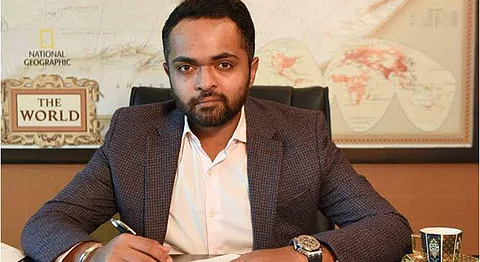
- HOMEGROWN WORLD
- #HGCREATORS
- #HGEXPLORE
- #HGVOICES
- #HGSHOP
- CAREERS
- ABOUT US
- CONTACT US

On November 26, 2008, a band of gunmen that the Indian government believed to belong to the Pakistani militant group Lashkar-e-Taiba carried out coordinated attacks that rocked the financial capital of India. Places were hit all over South Mumbai: Leopold Café, Cama Hospital, Nariman House, a Jewish community center, Chhatrapati Shivaji Terminus, Oberoi Trident, Metro Cinema, and the Taj Mahal Palace & Tower, which was the heart of the attack.
The attacks lasted over almost 3 days and claimed the lives of 116 people, including foreign tourists. From accusations of state sponsored terrorism hurled by India against Pakistan to Indian families mourning the loss of their loved ones, the events that unfolded on 26/11, a decade ago, was a national crisis. But for Sarjan P. Shah, who lost his father, Pankaj Shah, the tragedy was a deeply personal one.
Today, on the 10th anniversary of 26/11, Homegrown sat down with Sarjan, who took over the reigns from his father and grew into the shoes of Vice Chairman and Managing Director at Group Satellite, a company for real-estate developers that was established in 1971. Sarjan also set up the ‘26/11 Foundation,’ a think tank comprising world-class academics and practitioners and Indian security and diplomatic officials to tackle security issues in the country and develop functioning policies.
Homegrown: Take us through your feelings and reflections on this day. Do you feel they change a little bit every year? If yes, how?
Sarjan P. Shah: The shock of having your best friend and father taken from you in a matter of moments is indescribable. I still- to this day- can’t really explain how I went from receiving the news, to cremating him, holding a prayer meeting and taking his seat at the office in a matter of four days. He’s never left us in spirit, and every year I think all that happens is a little of the pain gets transformed into sheer determination to do more and do better.
HG: According to you, what is the number one national security issue that India needs to address right now?
SP: I’ve been personally involved in studying issues in international politics with a focus on strategic/security issues and affairs since my first degree at LSE. To me, there isn’t a single issue that is key, as much as a total system overhaul. From a high functioning civil-academic-private-govt network of academics and practitioners, to a robust process for long range strategic planning, and a resource allocation system that is sensitive to the evolving nature of India’s future threat matrix.
HG: Has Indian national security changed since 26/11? What improvements have been made, if at all?
SP: The change from 2008 to 2014 was largely symbolic and incremental, and the amount of resources dedicated to planning and technology was still minimal. Changes were ad hoc and reactive, as has been characteristic of Indian foreign policy since independence.
HG: Tell us about the kind of work this think tank will be doing and what some of the questions or insights you’re hoping to uncover are.
SP: The 26/11 Foundation will look to bring world-class academics and practitioners together with Indian security/diplomatic corps members in order to develop a robust research agenda with a specific India-focus. We will look to fund, facilitate, and publish white papers, position statements and monographs on the future of India’s threat matrices and the best ways to optimise India’s responses to them.
HG: Tell us about your father, how he’s impacted your life, and what you miss most about him now.
SP: He was the best friend a young boy could have: setting high standards while also playfully forgiving every transgression. Expecting honesty over good-judgment (which he knew I’d only learn with experience) and advising only ‘balance’ between all things in life. His absence has meant I’ve lost decades of wisdom and love and memories, but his void has also kept a fire burning in me, and the experiences of the last decade in his wake have moulded me into the man I am today.
HG: Tell us a little about your hope for the future of India. What do you feel strongly about and want to see change in?
SP: I hope for India to continue to invest in its institutional systems and processes, to prioritise process over outcome so as to be able to deliver governance sustainably over long periods of time. I hope to see a de-personalised form of leadership evolve in India. But I also hope that India takes a much more realistic view of global politics in order to arrive at long range strategic planning instead of ad hoc reactions as global events play out.
Feature image by: Sarjan P. Shah
If you enjoyed reading this, we suggest you read:
